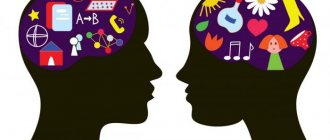What is this in psychology
The inner world of people includes character traits, acquired knowledge and skills. In psychology, human personality traits mean positive characteristics and properties.
Each person is an individual, distinguished by character traits, interests and needs, and the ability to set life priorities. This influences social relations and helps (or prevents) people from achieving specific goals.
To become a personality, a person goes through a difficult path of formation. The qualities of people are influenced by regulatory mechanisms:
- external – needs, interests, directions;
- internal – self-esteem, consciousness, respect, etc.
Note! Psychological qualities (character, temperament, state of mind) are important in a person. They guide the individual, make him capable (or incapable) of interacting with others, of performing a certain type of activity.
Personal qualities
Everyone comes into this world with zero knowledge and abilities, but with the makings of a temperament determined by the state of the nervous system and physiological characteristics. The further formation of a person’s personal qualities is influenced by the following aspects:
- the conditions in which the child grows up;
- educational measures taken towards him;
- relationships outside the family;
- even illnesses suffered in childhood.
Under the influence of these factors, some become phlegmatic and melancholic, while others become choleric and sanguine. Someone strives for communication, making plans for life and achieving goals. Others isolate themselves from the world and become fixated on satisfying personal needs.
Optimism
This is a very important quality, thanks to which a person can fully feel the joy of life, it is easier to deal with failures and overcome a bad mood. Explain to your child that even a bad situation brings something good, gives valuable experience, a point for a new start. Praise your baby's initiative, encourage him in case of failures and give him your optimistic view of the world.
Creative thinking
Albert Einstein said: “A successful person is always a stunning artist of his imagination. Imagination is much more important than knowledge, for knowledge is limited, but imagination is unlimited.”
It is creative thinking that helps us find sometimes unobvious ways out of the most difficult situations and solve the problems that life throws at us. And this is already half the success.
No one knows what the future of work will look like, but one thing is clear: it will be different from ours. Creative thinking will allow our children to quickly navigate the labor market, keep up with the times and, possibly, create their own jobs.
Ability to communicate with others
Scientists from Pennsylvania State University and Duke University conducted an interesting study. They followed the lives of about 700 American children from toddlers to 25 years old to see the connection between their social skills in childhood and their success in adulthood.
It turned out that sociable kids were more likely than their introverted peers to achieve success in life: in most cases, they graduated from college, got a good job by age 25, and had no criminal record.
Probably the reason is that socially developed children can calmly find a language with others, avoid conflict situations, be useful to other people and respect their feelings.
Moreover, the ability to communicate is not limited to the ability to speak. The author of the bestseller “The Seven Habits of Highly Effective People,” Stephen Covey, called the ability to communicate—that is, not so much to speak as to try to understand the interlocutor—the most important skill in a person’s life. “When we are awake, we communicate almost all the time. But think about this: we spend years learning to read and write, years learning to speak. What about listening? What kind of training have you taken to learn how to listen?”
It is important to teach your child to treat others with respect, to be able to avoid conflict situations and not to be selfish. This skill will be useful to a child even in the sandbox: children who know how to negotiate will not get into a fight for someone else’s shoulder blade, but will figure out how to play together for the common joy.
At school, such a child will not receive “failures” for his behavior and will once again spoil relationships with teachers and peers. And in case of failure in any subject, he will simply ask his classmates for help.
What can we say about adult life, where holders of scientific degrees often cannot achieve success and a good income due to their isolation, inability to communicate and work in a team. And more active people, although not always distinguished by a high IQ, occupy serious positions and become leaders.
It is important to remember that success is not measured by work alone. It consists of many factors, the main one of which is often called the support of loved ones. A person considers himself successful when he becomes a professional in his field, starts a strong family and maintains relationships with friends who will share his joy and support him in difficult times. And without developed communication skills, it can be difficult to form close relationships.
Classification of personality traits
The characteristics of people are assessed according to 2 parameters: internal and external. To consider the first ones, you need to talk with the person for some time. The second qualities are nothing more than a “signboard”; they do not always convey true information.
Inner world
Volitional personality traits - what is it in psychology, their formation
It can be rich in content or primitive. In the first case, people will be drawn to the person, assessing his personal qualities. In the second option, there is unlikely to be a desire to develop relationships. To become in demand in any environment, an individual must:
- look at the world positively;
- be able to think freely;
- do not depend on other people’s opinions (be yourself);
- take care of others;
- easy to make contact;
- realistically assess the situation.
Note! A person needs to develop his inner world, constantly absorbing new knowledge and applying it in practice. It is more interesting to communicate with a versatile, friendly personality.
External surroundings
People are greeted not only by their clothes, but also by their ability to present themselves. A beautiful sign is formed from the created image and behavior of a person. They work on the surroundings:
- attractive appearance;
- ability to choose a clothing style;
Image works for success
- beautiful body language;
- artistry;
- ability to conduct dialogue.
You can have a beautiful sign and at the same time have negative internal properties. Such disharmony cannot lead to real success.
Reasonable Courage
Healthy courage is formed on the basis of self-confidence, constant support of loved ones, and psychological comfort. It is important to teach the baby to correctly assess his strengths and act in stressful situations, without falling into a stupor and panic. To do this, you can periodically act out scenes where you change roles, portraying a bully and a victim. Show how to react to other people's attacks and fight back (this does not always mean physical aggression, most often you can resolve the conflict peacefully through constructive dialogues). Tell your child that being afraid is absolutely normal for everyone. Rational fear is simply necessary to protect against dangers! But even such strong emotions can be controlled. Conquer the beginnings of fears through coping practices, starting at a young age.
Volitional personality traits
Personality orientation - what is it in psychology, its types
In the process of life, a person gains certain experience. Depending on what processes you had to go through, your character is formed. Overcoming obstacles helps to realize the will of the individual.
Basic volitional qualities
| Characteristic | Peculiarities |
| Determination | Active, conscious, motivational movement towards a certain result. It is divided into 2 types: • strategy – the ability to be guided by beliefs, certain values, ideals; • tactics – the ability to set clear goals and not be distracted in the process of achieving them |
| Initiative | He is a certain “pusher” of determination. Initiative helps to overcome inertia and direct will in a specific direction |
| Independence | An active conscious attitude to act from the standpoint of one’s own beliefs and views, without being influenced by external factors |
| Excerpt | Ability to overcome obstacles in achieving goals. Requires self-control and self-control, the ability to choose the best course of action |
| Determination | Manifests itself in the ability to quickly make firm, informed decisions and implement them. At the same time, thinking about your actions from different positions, going through antagonism of motives and internal struggle with yourself is not excluded. |
| Courage | The first step in developing determination is determined by the ability to overcome fears and the ability to take justifiable risks. |
| Energy | Manifests itself in the concentration of internal forces necessary to obtain results. |
| Perseverance | It is a character trait that complements energy and allows one to mobilize strength for a long process of moving towards a goal. |
| Organization | A necessary quality that helps you intelligently plan and streamline your actions. |
| Discipline | Manifests itself in the conscious subordination of personal behavior to socially accepted norms and orders, taking into account the requirements of action |
| Self-control | It is a derivative of the component of discipline. Expressed in the ability to control one’s actions and direct behavior in the right direction, without succumbing to momentary impulses |
On the way to the goal
The described basic qualities are interconnected and complement each other. Will is a conscious, acquired personality trait that is developed in the process of setting a goal, the ability to move towards it, overcoming obstacles, and the ability to take responsibility for one’s own actions.
Positive example of parents: honesty
Children learn to interact with the surrounding reality by observing their parents, adopting their habits and behavior patterns. It is difficult for children to clearly understand what honesty is and what its value is, so words here will be ineffective. But specific life situations will give a positive result.
To begin with, it is important to understand: having caught you lying just a couple of times, a child can get the idea that this is how it is accepted and necessary, because even adults and quite good people lie. And then it will not be easy to convince him otherwise. Therefore, always tell the truth (at least in the presence of the child) and, no less important, allow the baby to be honest. Take the position of a calm, fair and reasonable parent. Do not yell at your child if he has made a mistake or confessed something unpleasant to you. Otherwise, he will stop trusting you and begin to hide everything that you might not like. A broken cup or a deuce in a diary is an insignificant price against the feeling of internal relief of conscience that a child can receive, isn’t it?
Social and psychological qualities of personality
Personality development - what is it in psychology
The properties and qualities of personality in social and psychological terms in social science do not have a single clear definition. In the scientific works of psychologists there are several different opinions on this topic. Here are the main ones:
- If we interpret the term “personality” as a synonym for the word “person,” then qualities mean characteristics. If personality is a component of qualities, then human traits are determined by social properties.
- Sometimes the concept of “socio-psychological traits” includes the opposition of basic and secondary properties (from the perspective of differences between personal and general psychological).
- The structure of an individual is perceived as a set of traits and properties. Or, on the contrary, as a specific system consisting not of qualities, but of other elements.
Based on this list, it is clear that it is difficult to unambiguously determine the socio-psychological properties of a person. Because, firstly, there is no specific list of such qualities and criteria for identifying them. Secondly, there are contradictions in the relationship between abilities and properties. All these aspects require close attention. Their essence will be studied by sociologists and psychologists for a long time.
The ability to see beauty around
You don’t have to live in the “Garden of Eden” to do this. It is enough just to be able to see beauty even in the ordinary: a yellowed leaf, a bug that accidentally flew in, a beautiful sunset. To do this, periodically stop the frantic rush of life and arrange “10 minutes of contemplation” of the world around you. Visit exhibitions together, notice the beauty in people and objects, let your little ones listen to high-quality, time-tested music, read fiction aloud more often.
Professional personality traits
It is not enough to gain certain knowledge in a particular professional activity. To achieve success in the chosen field, a person must have specific qualities. Regardless of the significance of the profession, a person’s abilities are classified into several categories:
- verbality – language proficiency, determination of the significance of concepts and words;
- numerical ability - the ability to accurately and quickly perform standard arithmetic operations;
- the ability to correct numbers, letters, words;
- have an idea of objects in 2-3 dimensions;
- ability to detail objects and graphic images;
- motor coordination - control of the movements of the eyes, legs and arms; the ability to coordinate them with certain signals;
- dexterity - the ability to manipulate small objects;
- perception of color shades, the ability to distinguish and compare them;
- general intelligence is the ability to learn, which consists of understanding and accepting the material being studied, the ability to reason and draw correct conclusions.
Human abilities
Based on the described properties, a list of psychological qualities necessary for specific professional activities is compiled. To become successful in business, other individual characteristics are also necessary. They are called social temperament and influence an individual’s confidence in certain operating conditions.
Types of individual psychological professional qualities:
- Typological properties, including lability of the nervous system, dynamism, mobility, strength.
- Perceptual and sensory properties, the level of which develops with the acquisition of skills.
- Individual attention, including elements such as switching, distribution, stability.
- Psychomotor skills, based on the development of certain operating systems necessary in solving professional problems.
- Mnemonics is the ability to remember material, techniques and the ability to develop professional memory.
Note! In any activity you need to be able to think and have imagination; strong-willed qualities are especially important. Without them, it will not be possible to overcome difficulties in the work process.
Moral properties of personality
At the genetic level, moral programs inherent in distant ancestors are laid in a person. These properties are adjusted by life under the influence of such factors:
- family education;
- the influence of the school and the yard company;
- social and personal relations;
- life experience.
Each aspect is subject to certain rules of moral behavior. They form the individual’s attitude towards himself and other people. Based on what values were embedded in the inner world, moral qualities are divided into categories: humanistic, nationalistic, racial, religious-fanatical.
Morality is established in childhood
Only the first category refers to positive characteristics. It is based on respect for all people, regardless of their religion, nationality and race.
Literature
1. Atlas of new professions [Text] // First edition - ASI, Skolkovo. – M., 2014. 2. Dodova, L.M. Psychological, social maturity and its phenomenological manifestations in adolescence [Text] // Prospects for the development of modern scientific knowledge: collection of scientific works - Cheboksary: Educational and Methodological Center, 2011. - P. 98-105. 3. Ivanchenko, G.V. On the threshold of a professional career: social problems and personal choice strategies [Text] // World of Russia. 2005. T. 14, No. 2. P. 97-125. 4. Makarov, V.V., Makarova G.A. Transactional analysis - Eastern version [Text]. - M.: Academic project, OPPL, 2002. 5. Petrova, G.I. “Self-care”: technology or anthropology? [Text] // Bulletin of Tomsk State University - Philosophy. Sociology. Political science. - 2009, No. 2(6), pp. 136-143. 6. Popov, A.A. Philosophy of open education. Socio-anthropological foundations and institutional and technological capabilities [Text]. Tomsk; Biysk: Publishing house. house "Biya", 2008. 7. Slobodchikov, V.I., E.I. Isaev Psychology of human development: development of subjective reality in ontogenesis [Text]: Textbook for universities. – M.: School press, 2000. 8. Strategy for the development of education in the Russian Federation for the period until 2025 [Text] // Order of the Government of the Russian Federation dated May 29, 2015 N 996-r, Moscow. - Russian newspaper - Federal issue No. 6693 (122), June 8, 2015 9. Modern educational technologies: textbook / edited by. ed. L.L. Rybtsova. - M.: Yurayt Publishing House, 2017; Ekaterinburg: Ural Publishing House. un-ta. 10. Stewart, Y. and W. Joines. Modern transactional analysis [Text]. - St. Petersburg: Social and Psychological Center, 1996.
How can a person develop personality traits?
Personality formation begins from the first years of life. Subsequently, the quality can only be adjusted. Work should be carried out in several directions: from establishing body language to developing individual abilities that are a priority in the chosen profession.
Without an active life position, way of existence, direction of actions, control of emotions and desires, it is impossible to achieve the desired level of development. The formation of positive personality traits should be based on the development of intelligence and increasing the level of culture.
We need to start with self-analysis
There are several methods, the first step is always the same - analyzing your own state. It helps you decide on the qualities that should be developed. An adequate assessment of personal significance will help set a goal, decide on a role model and develop ways to achieve results.
You can’t do this without self-discipline and self-confidence. Forming yourself as an individual is a long process, but it is worth putting in the effort.











